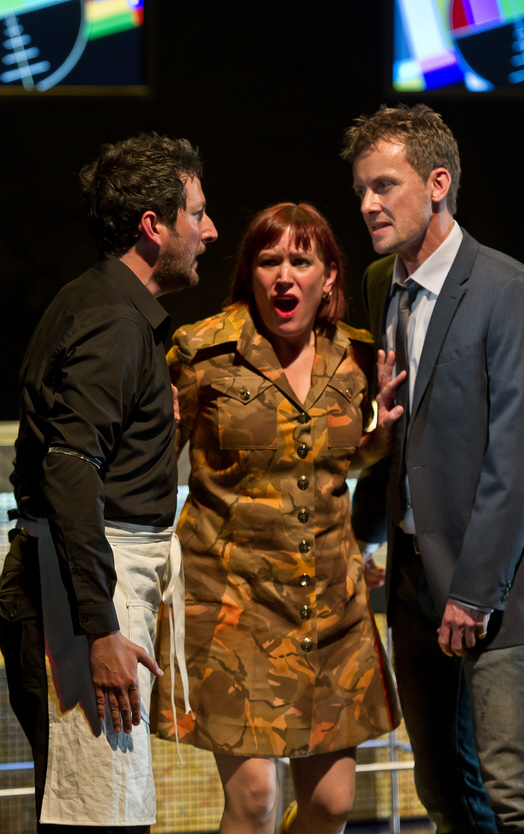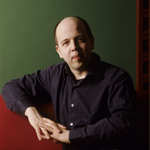Sherman Theatre, Cardiff, 2nd November 2012
Huw Watkins composer / David Harsent librettist: In the Locked Room
Stuart MacRae composer / Louise Welsh librettist: Ghost Patrol
Conductor: Michael Rafferty
Directors: Michael McCarthy (In the Locked Room)
Matthew Richardson (Ghost Patrol)
Cast: Paul Currievici / Jane Harrington / Ruby Hayes / James McOran-Campbell /
Nicholas Sharratt / Håkan Vramso / Louise Winter
‘Grand’ opera seems to be enjoying somewhat of a renaissance as big-hitting companies like London’s Royal Opera House and the New York Metropolitan seek international audiences through televised transmission of live shows and work to refute charges of elitism with productions aimed squarely at the ‘common man and woman’. The star charisma of singers and conductors, the spectacle and sheer romance of it all, seem to be gaining them new audiences eager for live action, familiar stories and emotional catharsis. But what of the more ‘difficult’, less popular repertoire? And – more to the point – what of new, contemporary opera? How do today’s composers approach a genre so weighty with tradition?
Huw Watkins and Stuart MacRae have both been nurtured by companies sensitive to the challenges encountered by composers new to opera. Watkins has worked with Music Theatre Wales in various ways since 2004, whilst MacRae has come though Scottish Opera’s pioneering Five:15 – a project first conceived in 2008 for five composers writing fifteen-minute works. It takes time and experience for any composer to find an authentic musical voice (if they do), but opera brings additional, unique demands and the many, subtle aspects of theatre production must, at times, seem a minefield. First and foremost, though, composers must decide what it is they want to say and how they want to say it.

Nick Sharratt Jane Harrington and James McOran-Campbell
photo by Clive Barda
Tonight’s programme was most thought-provoking in that regard. It presented Watkins’s In the Locked Room and MacRae’s Ghost Patrol as a touring double-bill of new, complementary works marking an innovative collaboration; that between two companies taking artistic control of an opera apiece within a joint production utilising two teams, with different composers, directors and casts working independently but alongside each other. Neither composer knew what the other was writing and the results give an intriguing comparative snap-shot of operatic thinking from two very different composers from the same generation.
From a performance perspective, the pairing was highly successful and the two companies should be congratulated. The operas sat well together and made for a meaty, tightly produced night of musical theatre. Praise is due to the impressive, well-matched casts who, together with the Music Theatre Wales Ensemble, performed with consistent excellence under conductor Michael Rafferty’s confident baton. The ensemble and instrumental writing was fluent overall; Watkins displaying his usual skilled craftsmanship and ear for beauty, with MacRae adding occasional electronics to an imaginative and distinctive, if sometimes overfussy, acoustic mix. Neither really soared vocally but the balance was good, with nothing unduly taxing for the singers, whilst the mises-en-scène offered effective vehicles for the largely plausible stage action (notwithstanding Watkins’s problematic ‘fantasy’ poet appearances). Whereas In the Locked Room could happily have been lengthened, giving the narrative room to breathe, Ghost Patrol was overlong, needing compression to tighten the drama, which sagged after an energetic start. A closer look at the drama in each case, however, leads to some less comfortable, wider questions.
The ensemble and instrumental writing was fluent overall; Watkins displaying his usual skilled craftsmanship and ear for beauty, with MacRae adding occasional electronics to an imaginative and distinctive, if sometimes overfussy, acoustic mix.
The subjects of the two operas are very different despite aspects of plot in common; each revolving around a love triangle which ends tragically, with female leads left pregnant but bereft. In the Watkins, Ella’s fantasies darkly engulf her unhappy world after the object of her obsession – a typically tortured poet – apparently commits suicide, whilst a more external conflict leads to the mutual killing of haunted ex-army comrades Sam and Alisdair in the MacRae. So far, so operatic perhaps. But it is precisely the conventionality of plot and dramatic approach that was striking tonight as, in both works, a desire to explore universal themes – albeit in strongly contrasting ways – similarly lapsed into romantic and social clichè.
Whereas In the Locked Room had more literary, formal strength – perhaps benefiting from librettist David Harsent’s veteran experience (credits including Harrison Birtwistle’s internationally-acclaimed The Minotaur) – MacRae and librettist Louise Welsh showed greater theatrical vitality in Ghost Patrol. But they too were thwarted by the notorious difficulty of creating internally congruent operatic characters that nonetheless retain the essential flaws and contradictions that give them human cogency. This difficulty is partly due to the inherent absurdity of opera; dialogue that is sung rather than spoken invokes a level of surreality from the outset. Ultimately, deeper layers must either be carried, or thrown into relief, by the music – but neither score here contained the theatrical instinct or dramatic subtlety to flesh-out characters borne of stereotype; indeed, Watkins seemed trapped by his very idiom, which was Britten-esque to the point of saturation.
Both operas inhabited a simplistic, binary moral world in which oppositions framed in deeply conventional terms – good-bad, military-civilian, male-female and art-business – shaped the story. Again – so far, so operatic perhaps. But here there was little, if any, of the requisite underlying psychological depth or social critique. Positioning women as victims may be so time-honoured as to constitute operatic fetish, but the unquestioning narrative reliance on this in both works was disquieting. Watkins portrayed an insipid, entirely self-absorbed world in which Ella slips passively into solipsism and the only energy is displayed by her materialist, banker husband. MacRae’s Vicki pleads with her typically sensitive/macho ex-soldiers to ‘leave the war behind’, but this becomes just one of several empty homilies; repetition of which increase as the opera goes on, and which lends the conclusion a morose fatalism: ‘only the dead see the end of war’. Along the way, some obvious imagery (remembrance poppies for ‘blood on your hands’) fails to develop aspects of class, militarism or politics, which might have added dramatic depth.
Certainly, Watkins and MacRae more than fulfilled their remit for this admirable joint project, and the sheer professionalism of their work testifies to their success on many levels, not to mention the careful nurturing of Music Theatre Wales and Scottish Opera. If tonight’s two works beg reappraisal of what opera – and writing opera – means today, that too should rightly be deemed positive. In any case, mute observation or mere wringing of the hands at personal and social tragedy is surely disengenuous post, say, Britten’s The Turn of the Screw or Berg’s Wozzeck – which were, after all, written a long, or very long, time ago. There is no reason why an opera composer should write with direct psychological or social – let alone political – intent. But writing an opera – a genre culturally charged by its very nature and history – cannot help but be an act of social as well as dramatic engagement, whatever the narrative or setting. It will be intriguing to see where Watkins and MacRae go operatically from here; how – or whether – they develop their feel for theatre, and to what they next choose to give music-dramatic voice. Hopefully they will get the opportunity to do so.











